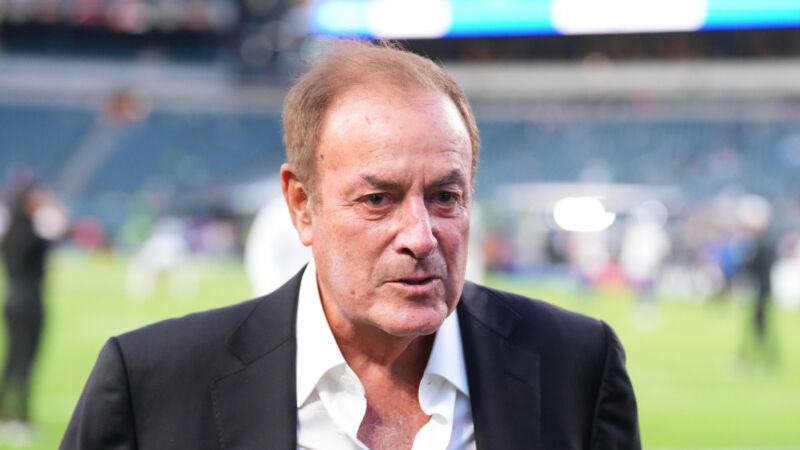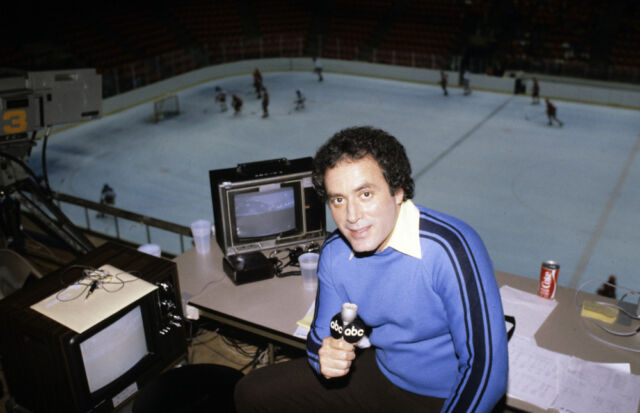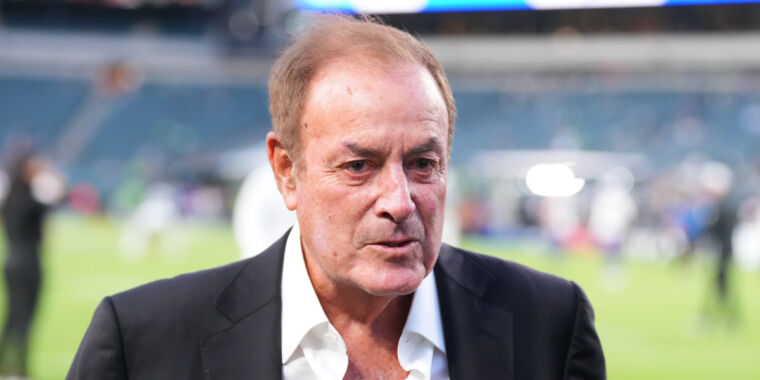AI-generated Al Michaels to provide daily recaps during 2024 Summer Olympics
forever young —
AI voice clone will narrate daily Olympics video recaps; critics call it a “code-generated ghoul.”

Enlarge / Al Michaels looks on prior to the game between the Minnesota Vikings and Philadelphia Eagles at Lincoln Financial Field on September 14, 2023, in Philadelphia, Pennsylvania.
On Wednesday, NBC announced plans to use an AI-generated clone of famous sports commentator Al Michaels‘ voice to narrate daily streaming video recaps of the 2024 Summer Olympics in Paris, which start on July 26. The AI-powered narration will feature in “Your Daily Olympic Recap on Peacock,” NBC’s streaming service. But this new, high-profile use of voice cloning worries critics, who say the technology may muscle out upcoming sports commentators by keeping old personas around forever.
NBC says it has created a “high-quality AI re-creation” of Michaels’ voice, trained on Michaels’ past NBC appearances to capture his distinctive delivery style.
The veteran broadcaster, revered in the sports commentator world for his iconic “Do you believe in miracles? Yes!” call during the 1980 Winter Olympics, has been covering sports on TV since 1971, including a high-profile run of play-by-play coverage of NFL football games for both ABC and NBC since the 1980s. NBC dropped him from NFL coverage in 2023, however, possibly due to his age.
Michaels, who is 79 years old, shared his initial skepticism about the project in an interview with Vanity Fair, as NBC News notes. After hearing the AI version of his voice, which can greet viewers by name, he described the experience as “astonishing” and “a little bit frightening.” He said the AI recreation was “almost 2% off perfect” in mimicking his style.
The Vanity Fair article provides some insight into how NBC’s new AI system works. It first uses a large language model (similar technology to what powers ChatGPT) to analyze subtitles and metadata from NBC’s Olympics video coverage, summarizing events and writing custom output to imitate Michaels’ style. This text is then fed into an unspecified voice AI model trained on Michaels’ previous NBC appearances, reportedly replicating his unique pronunciations and intonations.
NBC estimates that the system could generate nearly 7 million personalized variants of the recaps across the US during the games, pulled from the network’s 5,000 hours of live coverage. Using the system, each Peacock user will receive about 10 minutes of personalized highlights.
A diminished role for humans in the future?

Enlarge / Al Michaels reports on the Sweden vs. USA men’s ice hockey game at the 1980 Olympic Winter Games on February 12, 1980.
It’s no secret that while AI is wildly hyped right now, it’s also controversial among some. Upon hearing the NBC announcement, critics of AI technology reacted strongly. “@NBCSports, this is gross,” tweeted actress and filmmaker Justine Bateman, who frequently uses X to criticize technologies that might replace human writers or performers in the future.
A thread of similar responses from X users reacting to the sample video provided above included criticisms such as, “Sounds pretty off when it’s just the same tone for every single word.” Another user wrote, “It just sounds so unnatural. No one talks like that.”
The technology will not replace NBC’s regular human sports commentators during this year’s Olympics coverage, and like other forms of AI, it leans heavily on existing human work by analyzing and regurgitating human-created content in the form of captions pulled from NBC footage.
Looking down the line, due to AI media cloning technologies like voice, video, and image synthesis, today’s celebrities may be able to attain a form of media immortality that allows new iterations of their likenesses to persist through the generations, potentially earning licensing fees for whoever holds the rights.
We’ve already seen it with James Earl Jones playing Darth Vader’s voice, and the trend will likely continue with other celebrity voices, provided the money is right. Eventually, it may extend to famous musicians through music synthesis and famous actors in video-synthesis applications as well.
The possibility of being muscled out by AI replicas factored heavily into a Hollywood actors’ strike last year, with SAG-AFTRA union President Fran Drescher saying, “If we don’t stand tall right now, we are all going to be in trouble. We are all going to be in jeopardy of being replaced by machines.”
For companies that like to monetize media properties for as long as possible, AI may provide a way to maintain a media legacy through automation. But future human performers may have to compete against all of the greatest performers of the past, rendered through AI, to break out and forge a new career—provided there will be room for human performers at all.
“Al Michaels became Al Michaels because he was brought in to replace people who died, or retired, or moved on,” tweeted a writer named Geonn Cannon on X. “If he can’t do the job anymore, it’s time to let the next Al Michaels have a shot at it instead of just planting a code-generated ghoul in an empty chair.“
AI-generated Al Michaels to provide daily recaps during 2024 Summer Olympics Read More »
